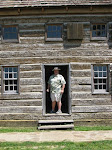| Ella Fitgerald, 1950 Carl Van Vechten |
Today marks a mid-point between two significant birthdays in the world of American jazz and popular music. Indeed it is a week of "firsts." On April April 25, 1917, Ella Jane Fitzgerald, the "First Lady of Song" arrived on the American scene in Newport News, Virginia. Earlier, Edward Kennedy "Duke" Ellington, was born on April 29, 1899 in Washington, DC. According to a Jazz at Lincoln Center bio, Ellington was "the most prolific prolific of American composers in terms of number of compositions and variety of forms."
In 1934, Fitzgerald wanted to dance at an amateur night at the Apollo in Harlem, but was intimidated by other dancers and decided to sing instead. It was the beginning of a career that took her magnificent voice through the big bands, to jazz, bop, and the Great American Songbook. With a voice ranging from smoky to bright she put her signature on every note and sharp diction on every word. For people who like to immerse themselves in lyrics, Ella was unbeatable. And when she forgot those lyrics or let the spontaneity flow, the scat singing was priceless.
I saw her perform once in an overcrowded, hot venue in Washington. After a few songs, the crowd didn't mind the environment. She had us wrapped in music for over two hours and left us wanting more after several encores. Everyone had a great time that night, especially Ella. Looking back on that concert, I realize how significant it was. Ella had turned 50 and completed her famous songbook series a few years earlier. And though her peak years were coming to an end, what she had left exceeded the best of what most 20th century singers ever offered. She went on to perform another quarter of a century dazzling audiences everywhere. Ella passed away in 1996, but she's still making her mark, living on through a huge discography and video record. In all, it is an immense,iconic legacy.
Throughout her very public life, Ella Fitzgerald remained a private, if not shy, person. Were she receiving a birthday cake today, I can envision a broad, approving smile and nervous glances from squinting eyes behind those big bottle bottom glasses. She'd respond with a heart-felt "Thank you, thank you," and move into the comfort and safety of song.
Happy birthday, Ella. What a lady, that First Lady of Song. Thank you! Thank you!
Here is part one - of four parts on YouTube - of a the superb BBC bio of Fitzgerald produced for its "Legends" series.
And here is Ella at her best with a Johnny Mercer standard:
Smooth, high brow, faultless, sophisticated, American. All of these words describe the music that came out of the world of Edward Kennedy "Duke" Ellington as a composer, performer, and conductor. For fifty years he defined jazz in his own way with his superbly talented jazz orchestra, surviving the onslaught of bebop, rhythm and blues, and rock and roll. His discography includes over seventy hit records out of hundreds of releases spanning seven decades.
 |
| Ellington at the piano in the early years. Elegant as always |
He formed a band while in his teens and played the circuit in and around the nation's capital before moving to New York. There, his creative fervor and gentlemanly demeanor made him an influential force in the Harlem Renaissance. He was a star much appreciated in Europe as well as the United States by the mid '30s. His collaboration with the brilliant composer and arranger, Billy Strayhorn, later in that decade and again in the '60s enhanced his fame and helped him bridge gaps between jazz and other musical genres.
Ellington passed away almost forty years ago and with his passing the nation lost both a legendary technician at the piano and its strongest advocate for the American musical invention called jazz. To learn more about this extraordinary entertainer visit the Official Website of Jazz Legend Duke Ellington. The Duke Ellington Society website is another excellent information source, including the significant story of the contributions of Billy Strayhorn.
"It don't mean a thing" if OTR posts about music but fails to give his readers an opportunity to hear it. Here are some examples of the Ellington expression in action:
Ellington passed away almost forty years ago and with his passing the nation lost both a legendary technician at the piano and its strongest advocate for the American musical invention called jazz. To learn more about this extraordinary entertainer visit the Official Website of Jazz Legend Duke Ellington. The Duke Ellington Society website is another excellent information source, including the significant story of the contributions of Billy Strayhorn.
"It don't mean a thing" if OTR posts about music but fails to give his readers an opportunity to hear it. Here are some examples of the Ellington expression in action:
Ellington was an amazing force in American music. When you put him together in performance with the First Lady of Song...
Priceless.

No comments:
Post a Comment